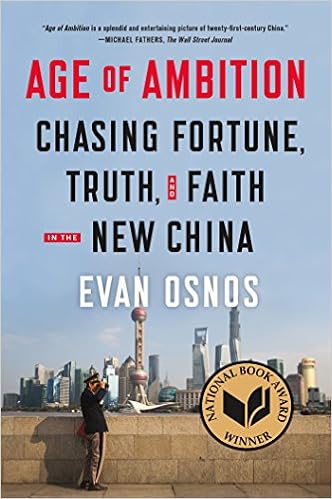Age of Ambition: Chasing Fortune, Truth, and Faith in the New China: Evan Osnos: 9780374535278: Amazon.com: Books 2015


Listen

Age of Ambition: Chasing Fortune, Truth, and Faith in the New ChinaPaperback – May 5, 2015
by Evan Osnos (Author)
4.5 out of 5 stars 316 customer reviews
Pulitzer Prize in General Nonfiction finalist
Winner of the 2014 National Book Award in nonfiction
An Economist Best Book of 2014
Winner of the bronze medal for the Council on Foreign Relations’ 2015 Arthur Ross Book Award
A vibrant, colorful, and revelatory inner history of China during a moment of profound transformation
Winner of the 2014 National Book Award in nonfiction
An Economist Best Book of 2014
Winner of the bronze medal for the Council on Foreign Relations’ 2015 Arthur Ross Book Award
A vibrant, colorful, and revelatory inner history of China during a moment of profound transformation
From abroad, we often see China as a caricature: a nation of pragmatic plutocrats and ruthlessly dedicated students destined to rule the global economy-or an addled Goliath, riddled with corruption and on the edge of stagnation. What we don't see is how both powerful and ordinary people are remaking their lives as their country dramatically changes.
As the Beijing correspondent for The New Yorker, Evan Osnos was on the ground in China for years, witness to profound political, economic, and cultural upheaval. In Age of Ambition, he describes the greatest collision taking place in that country: the clash between the rise of the individual and the Communist Party's struggle to retain control. He asks probing questions: Why does a government with more success lifting people from poverty than any civilization in history choose to put strict restraints on freedom of expression? Why do millions of young Chinese professionals-fluent in English and devoted to Western pop culture-consider themselves "angry youth," dedicated to resisting the West's influence? How are Chinese from all strata finding meaning after two decades of the relentless pursuit of wealth?
Writing with great narrative verve and a keen sense of irony, Osnos follows the moving stories of everyday people and reveals life in the new China to be a battleground between aspiration and authoritarianism, in which only one can prevail.
As the Beijing correspondent for The New Yorker, Evan Osnos was on the ground in China for years, witness to profound political, economic, and cultural upheaval. In Age of Ambition, he describes the greatest collision taking place in that country: the clash between the rise of the individual and the Communist Party's struggle to retain control. He asks probing questions: Why does a government with more success lifting people from poverty than any civilization in history choose to put strict restraints on freedom of expression? Why do millions of young Chinese professionals-fluent in English and devoted to Western pop culture-consider themselves "angry youth," dedicated to resisting the West's influence? How are Chinese from all strata finding meaning after two decades of the relentless pursuit of wealth?
Writing with great narrative verve and a keen sense of irony, Osnos follows the moving stories of everyday people and reveals life in the new China to be a battleground between aspiration and authoritarianism, in which only one can prevail.
See all 14 formats and editions
Kindle
$10.44Read with Our Free App
Paperback
$9.98106 Used from $1.9857 New from $4.89
Product details
Paperback: 416 pages

Follow
Biography
Evan Osnos is a staff writer at The New Yorker, where he served as the China correspondent from 2008 to 2013. He is the winner of two Overseas Press Club awards and the Asia Society's Osborn Elliott Prize for Excellence in Journalism on Asia. Previously, he worked at the Chicago Tribune, where he was part of a team that won the Pulitzer Prize for investigative reporting in 2008. He lives in Washington, D.C.
316 customer reviews
4.5 out of 5 stars
4.5 out of 5 stars
5 star 66%
4 star 25%
3 star 4%
2 star 3%
1 star 2%
Showing 1-8 of 316 reviews
Top Reviews
Oracle of Adelphi
5.0 out of 5 starsA rare balanceMay 18, 2014
Format: HardcoverVerified Purchase
China books seem especially tricky to write, because the writer has to please two very different types of American reader: the one who has a great deal of experience with China, and the one who does not. The first reader cringes if he has to read yet another description of how Shenzhen used to be a fishing village; but the second reader can't really understand Shenzhen unless you explain this fact. (As a strange hybrid of these two readers -- I lived in China but have no deep expertise in its history -- I often experience the worst of both worlds.)
This book strikes a rare balance. It's a very absorbing read, and its multiple story-lines are impressively woven together, without any of the stitches showing. The people Osnos writes about run the gamut from a public figure like Lin Yifu (the World Bank economist who defected to mainland China from Taiwan in 1979) to an obscure figure like Michael Zhang, a young energetic optimist whom Osnos first meets at a Crazy English conference and then follows for a few years. (Zhang turns into one of the most interesting characters in the book.)
Osnos tells all these individual stories against the backdrop of most of the major events in China of the last five years: the violence in Xinjiang, the Liu Xiaobo fiasco, the "Jasmine" events of 2011, Ai Weiwei's ordeal, the flight of Chen Guangcheng, the Bo Xilai scandal, the bullet train crash, and so on. You learn a great deal about all these events, but the book is anchored in its very humane profiles of individual Chinese who are trying to make their lives better.
210 people found this helpful
HelpfulComment Report abuse
Robert J. Crawford
5.0 out of 5 starsan authoritarian developmental state on the cusp of change - or dissolution?January 11, 2019
Format: PaperbackVerified Purchase
Over 20 years ago, I traveled regularly to China to work mostly as a reporter/researcher on business. In the mid-90s, with the economy humming and giant new Chinese companies emerging, most citizens seemed to have struck a bargain: so long as their lives were improving, they were more or less content to look away from politics. The Tiananmen Square movement and its bloody aftermath went unmentioned or were hushed up; the authoritarian regime remained intact and heavy. Now, according to Evan Osnos in his brilliant look at early 21C China, that equation is changing.
Osnos breaks the book into 3 sections. First, there is "chasing fortune", which is about the new ambitions and new rich. When I was there, people did not want to stand out as individuals much, but most of them seemed hopeful that things were improving, in a kind of Chinese version of the American dream. Now, tiny sections of society have become immensely rich, spawning all manner of corruption and inequality. This is very fun for the coverage of the aspirations of the young and the stories of some who made it big, including entrepreneurs, bureaucrats, nationalist bloggers, and writers.
Second, there is the search for "truth". This is about those who are pushing against the system, challenging it overtly over the internet as well as by legal action. Osnos' coverage ranges from dissidents to investigative journalists and activists. To his credit, Osnos sought out a wide array of people, getting to know many of them personally and following their careers as the book progressed. Their trials and tribulations can be very difficult and painful, as in the efforts to break the performance artist and architect Ai Weiwei. But there is also a journalist who instinctually knows just how far she should push things, often getting warnings and even brief periods of detention. I was astonished to learn that 1 in 100 people in China is engaged in some form of state-sponsored information control, either as censorship or surveillance or covert counter-agitprop. Though the regime is holding on, no one seems to believe in its ideology anymore; many even doubt its competence. (I.e. the popular view in the circles I wrote in - that an authoritarian regime is superior because it can make decisions quickly and with few people involved - appears to stupidly over-estimate its accomplishments.)
Finally, there is the section on "faith", exploring the meaning in their lives, be it religious, ideological, or political. This follows the evolution of characters we've gotten to know. What struck me was the feeling that growth and opportunity were stalling, that the combination of official opaqueness and frustrated ambitions were swelling into what could become an immense challenge to the party if it seeks to maintain its monopoly on power. In other words, the old bargain is in dire need of renewal, perhaps in the form of new freedoms and even the emergence of new parties, particularly if economic growth is slowing. This was the thing that had most changed since I explored corporate boardrooms, met with talented workers, and taught writing at Beida. It is a potential sea change that no one should under-estimate.
Osnos' book is one of the best recent ones I have read on China. It is mostly about the period he was there, 2005-2013, which saw the rise of the internet and social networking (his portrayal of their impact under the heavy hand of the sate is nuanced and surprising). As such, it is a snapshot and should be read now, as it will no doubt be over-taken by events in the near future. Beyond his first rate reporting, Osnos is a beautiful writer. It was a great update for me, an old hand China watcher. Recommended with enthusiasm.
8 people found this helpful
HelpfulComment Report abuse
Kindle Customer
5.0 out of 5 starsAn brilliant work of authorshipApril 29, 2018
Format: PaperbackVerified Purchase
An brilliant work of authorship. Perhaps one of the finest pieces of writing I have read - ever. It is impossible to capture the essence of a society. Other authors take an econometric approach leading to prosaic works. Evan Osnos is crisp, gets the meaning out while keeping a fast paced, almost thriller like composition. Evan picks unique personalities and with them we travel through new age of China. Book shows how the society is conflicted - it espouses capitalism as the only known source of alleviating poverty, yet it finds that adopting the "capitalistic method" conflicts with their past which espoused homogeneity, a party which is not accountable for its actions and a population which is almost irreparably split into haves and have nots.
No comments:
Post a Comment